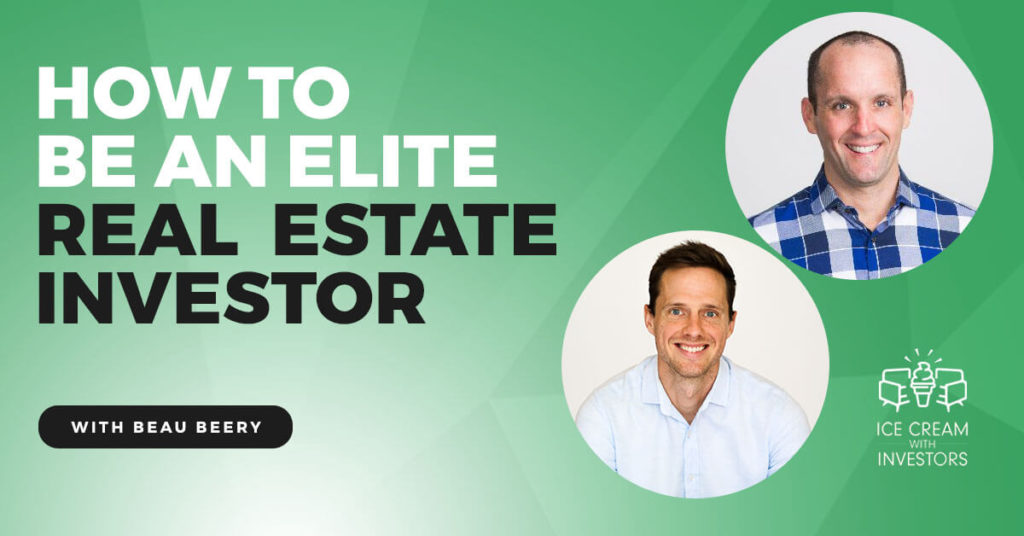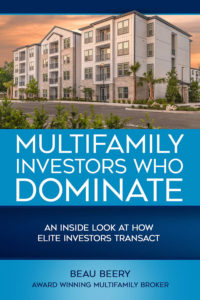What’s the difference between an elite real estate investor and a regular investor? Multifamily real estate advisor Beau Beery has the answer. Beau was ranked as the #1 multifamily producer in Florida and among the Top 5 in the nation every year before starting his own private multifamily brokerage firm in 2021. Beau is also the author of Multifamily Investors Who Dominate: An Inside Look At How Elite Investors Transact. In this episode, he chats with Matt Fore about his real estate journey with lessons on how to become an elite investor in the space and tips on how to systematize your relationship-building and sales processes for better results. Beau also shares the value of having a mentor as a partner, when to re-trade, and how Youtube can be a helpful platform for you and your customer. Don’t miss out on these golden nuggets that will help elevate your investing game.
—
Watch the episode here
Listen to the podcast here
How To Be An Elite Real Estate Investor With Beau Beery
In this episode, we have Beau Beery. Beau has been in the commercial real estate business in Florida since 1999. He earned his Bachelor’s degree and Master’s degree at the University of Florida, and also held a CCIM. As a broker with Coldwell Banker, he was consistently ranked as the number one multifamily producer in Florida and among the top five in the nation every single year before starting his own brokerage firm in 2021.
He also has his ever-growing YouTube channel called Beau Knows Multifamily, where he also guides viewers on how to buy more multifamily assets, how to sell them, and how to conduct market analysis. I’m super excited to have another broker on the show and talk us through where we can separate ourselves as investors in the multifamily space. Beau, welcome to the show.
Thanks for having me. It’s good to connect again.
We like to start off with the difficult questions here. What’s your favorite ice cream?
It’s strawberry. When I go to McDonald’s with the kids, I always get a milkshake, especially if it’s on a Saturday. Saturday is my free day. I eat whatever I want. I always end up getting the strawberries. I have to go with strawberry.
Do you get a McFlurry with all the toppings in it too?
I don’t. It’s just the regular strawberry shake. That’s it. If I go to the crazy ice cream stores, I get a whole bunch of ice cream. I like the mint, the chocolate chip and all that stuff, but strawberry is consistent. It’s always going to be good.
It’s funny. That was my favorite growing up. I don’t think anybody as a kid like that, but I loved strawberries as a kid.
I do too.
Tell our readers what’s the scoop. What do you do?

Elite Real Estate Investor: If you have about 150 diehard customers in real estate, you will have the biggest income for a 20, 30, or 40-year career that you could ever imagine.
I’m a multifamily broker. I cover the Northern half of Florida. I do anything over ten units, conventional housing or student housing. I cover from Polk County, which is Lakeland in Winter Haven, all the way North of Tallahassee, Jacksonville down the coast of Daytona, Gainesville, Ocala, all those areas. My primary customer is the small syndication up to the medium size syndication. I don’t do much business with national investment companies or real estate investment trusts. They use different types of publicly traded brokerages to do their business.
Tell our readers. Where did your real estate journey begin?
The first taste that got me excited was as soon as I graduated from UF with my undergrad degree, I wanted to be a personal trainer. I didn’t get the one job I wanted as a personal trainer. I was walking to the gym one day, and a buddy of mine was at the top of the stairs. He’s like, “What’s going on?” I’m like, “I graduated. I didn’t get the job I wanted.” He’s like, “As a matter of fact, I do leasing and property management on a 400-unit apartment complex we are building now in Gainesville. It’s still under construction. We need help leasing apartments and managing and handling phone calls. It pays $30,000 to $35,000 a year. Are you interested?” I’m like, “I don’t have anything. That sounds good to me.”
I went to an interview and got hired. Within a few months, I was the top leasing guy and fell in love with the business. What made me fall in love with real estate and investment real estate in particular was the property manager was cool and showed me the books. She would show me the profit and loss statements and the balance sheets. I was watching essentially 800 people paying for this asset, paying down the principal mortgage every day. I never saw the owners. They came once a year, maybe, and I didn’t even get to even talk to them or see them.
These guys, which was Trammell Crow Residential, which I didn’t even know at the time was one of the largest department developers in the country, was one of dozens of assets that they have and every day paying down a huge principal amount on the mortgage, not to mention the net income that was coming in. I thought to myself, “I got to get a piece of this.” That’s when I stepped up my education when I did my Master’s degree in real estate and took off from there.
I want you to tell the story of how you got into your Master’s program. One of the things I’m super excited to have this conversation with you is not only how we can separate ourselves as investors when we are talking to brokers but also the tenacity and the processes you have around sales. Can you tell us how did you get into that Master’s program?
I hate standardized testing. I hate that it’s required. I know that you have to have a weed-out process in colleges. Otherwise, everyone would be able to get in. One of those things is you have to have a certain score on the GMAT, a certain GPA to get in, and even work experience, but it was recommended. I had decent work experience. I had been with Trammell Crow Residential at that point for a few years. I only had a 3.5 GPA only coming out of UF, and everyone nowadays is a 4.5.
I could not pass this GMAT test. I took it several times and couldn’t pass it. A darling lady named Pam DeMichele was the Head of Admissions for the Master’s and Real Estate Program. She was a swimmer like I was a swimmer. She was the one who I believed could get me into the program and convince the professor to make an exception. Every day for about fourteen months, Monday through Friday at about 7:30 AM, I called her. Every time she answered, I would go, “Good morning, Pam.”
I’m sure it was annoying at first, but I grew on her. Over the course of a year, I wore them down. They started probably pulling from me more. I finally, with their insistence, passed the GMAT test and got in. That was a phenomenal program because it’s not just about what you learn in the program. That’s all great stuff, but as you know, there are 150 board members in that program that are the who’s who of Florida real estate, people who have propelled my career over the last years, and people I have done business with. It’s a true fraternity and sorority of the best of the best through that program.
What I’m taking from that story is to be consistent and memorable. Your good morning, Pam, I’m assuming you got that from Robin Williams’ Good Morning, Vietnam.
If you have a hard time making decisions, it’s either a ‘hell no’ or a ‘hell yes’. If you have to think about “should I do this?”, it’s a hell no. Don’t do it. The things that are worth something today are always a ‘hell yes’.CLICK TO TWEET
That’s exactly right.
I want to get into the Master’s program, but before we do, you said you were a swimmer. Did you swim at UF too?
No, I didn’t. I didn’t pick it up until I was about 30 years old. I was doing triathlons and biking to wear me down. It’s too dangerous. Running killed my back. I liked the swimming part of it and got better at it. I focus on that now. I see Pam in the pool still every now and then.
I am an Ironman triathlete myself, so we’ll nerd out on that. In the Master’s program, I have been dying to ask this question to somebody that’s gone through it, so this is a personal question. Did you feel like it was worth it? You mentioned the network, but the learning aspect of it, is that something you would recommend again? Do you feel like you could get some of that off of YouTube and the courses that people put together nowadays?
From the coursework standpoint, you could probably learn that stuff through CCIM and, if you are a multifamily guy, connect with other multifamily investors in some of these groups that have been formed where you pay a monthly membership. I believe you could learn the scholastics part of it. What you can’t learn is you are connected to not only the 150 board members but those who come in and teach and meet the students. You can’t call these people up.
Normal human beings, even in real estate, can’t call some of the people I have met and now know because they would never take your call. These are CEOs and COOs of huge companies. They are very important and wealthy people that when you are alumni of UF, of that particular program, you are like a brotherhood and a sisterhood. They want to see you succeed. That, to me, is what you are buying. When I was in that program, I wanted to get good grades, but it wasn’t my priority. I didn’t stress all day at night to get good grades. I made a job of getting to know those 150 people. That’s what I wanted.
It has probably led you to a lot of your successes as a broker. Transitioning that conversation, you were the number 1 broker in Florida and the top 5 across the country. What’s the secret?
I am a marketing and systems person who has learned real estate rather than a real estate person who is trying to learn marketing, branding, and systems. What I mean by that is CRMs, personal branding, learning what the customer wants and giving it to them, not being salesy, super high integrity, morals, and telling it how it is, that’s what’s wanted in the world, not just real estate. The real estate part of stuff is easy.
It’s dollars, cents, proformas, cap rates, IRR, and cash-on-cash. You can learn that stuff pretty quickly. It’s the intangibles that separate you. The problem is as a real estate broker, anybody can get a license. My child, when he turns old enough, can go and get his license. It’s easy to pass the course. That’s the problem. They make it so easy. You have a lot of yahoos who get in the business, which is fortunate because it makes people who are remotely competent standout.
I have heard you talk about your systems and how you systematized your relationships and follow-ups. I want you to talk a little bit about that. I don’t know how to ask that direct question. Can you talk a little bit when you are looking at the 100 or 200 or so assets in North Florida on how you find the owners and how you figure out who the players are and all that?

Elite Real Estate Investor: If you’re new, the only thing to do is to team up with a mentor.
There are 1,996 apartment complexes over 10 units in the Northern half of Florida. That includes conventional, student housing, and affordable housing. Conventional is about 70% to 75% of that, which is where most of my deals are done. Coincidentally, 75% of the transactions that sell are conventional. Those are owned by only 1,000 people. It fluctuates from 990 to 1,005, somewhere in there. It’s a very small world. From a REIT down to a mom-and-pop, only 300 owners own every conventional asset over 100 units. Three hundred people control that wealth. The top 5% of investors own 27% of the assets. It’s amazing. The top 1% own 11%.
I wanted to define who is every human being that I could ever do business with. I want to get them into a CRM. I want to call them. I want to figure out of those 1,000 people who would ever even do business with me, who are the people who would possibly save my name and their cell phone after a phone call, and who would call me to hire me. One of the problems with a lot of newer brokers starting off, and it’s not their fault, it’s the broker’s fault, is they don’t discourage them to go after whales. Whales aren’t going to hire the 22-year-old.
You may get a 500-unit listing every 2 or 3 years. As an independent broker not associated with a national brand, I knew I would never get hired to sell a $200 million asset. It’s not going to happen. They are going to hire CB Richard Ellis or Marcus & Millichap publicly traded companies. When I looked at my transactional history, almost every one of my deals was as of a certain avatar or investor. What I did was export every asset that exists in my markets from the tax assessor website. That is the only source on the planet that has every asset. CoStar doesn’t have every asset. LoopNet doesn’t have it. Reese doesn’t have it.
All these paid syndications get their information from tax assessor websites because that is the only source that has it. The reason it’s the only source is they want to tax you. I exported every single asset from all the Florida counties I cover into an Excel spreadsheet, which most municipalities can do. I then supplemented the information I didn’t get because tax assessors usually just give you the parcel number and the name of the owner, which is always an LLC, and nothing else. They will give you a number of acres. Some municipalities have a number of units, and most don’t. It’s just basic stuff when it sold, what it sold for, and all that stuff.
I wanted to know the first name, last name, email address, phone number, cellphone, wife, kids, where they went to school, articles they wrote, articles about them, what their background picture is on Facebook, what their picture is on LinkedIn, and who we know together on LinkedIn. I know more about those 1,000 people that if they knew what I knew about them, they would be freaked the heck out. It’s all public information. My strategy was I knew most every broker, when they made phone calls, would say, “My name’s Matt. I’m with so-and-so. I see you own ABC apartments. The market’s hot. Do you want to sell?”
I knew every broker was doing that, and I knew every investor hated that phone call because I hate that phone call. I own real estate, and people call me. I don’t want that phone call. I wanted to flip it on its head. What does every investor on the planet want? They want to buy more real estate, every single one of them. Everyone wants to buy real estate. If they already own assets, they want to buy them. Unless they are 85 years old, they want to buy more assets.
Once I got all the information in an Excel spreadsheet, like every single column had a piece of information, I then imported it into a CRM. I use RealNex. There’s a whole bunch of them out there, but most CRMs allow you and talk to Excel spreadsheets. I had a RealNex representative do the import for me so that it automatically populated every single field in the CRM. This takes months and months to do this stuff. I’m paying outside people for contact information and my assistant to find information about these guys and download pictures, photographs, families, and all this stuff. My goal was not to make 100 calls a day like everybody else. That’s pointless. You are never building a relationship with anybody.
I’m going to make 2 or 3 phone calls a day that are super effective. I wanted that person to get off the phone with me. When he had dinner with his wife or husband that night, I want them to say, “Honey, this guy Beau Beery called me. He’s at some broker at Gainesville. He called me up. What an unbelievable human being. That guy had stats out the wazoo. He spoke to me about what I wanted. He asked me what I was looking for. Let me tell you about the system he has set up.” That’s what I wanted. That was my goal. Once I imported everything, I immediately wanted to start categorizing every phone call as a rank A, B, or C customer.
The rank A person who represents about 8% to 10% of all investors was the person I have jived with in that first phone call. We got along. We either knew some people together or had the same philosophies. I felt like they were going to save my name on their phone afterward. That was rank A, and they owned assets I could sell that they would hire me for. Rank Bs were As, but they have several broker relationships, or I’m going to have to work a little bit harder to get into graces with them and maybe earn them into an A. The Cs were people who were never going to hire. C never becomes an A. They may become a B one day. Cs, for me, were real estate investment trusts and national corporations. Their best friend in the entire world is a broker. They went to college and lived together.
No matter what, even if I send them $500,000, they are never going to use me. For each ranking, I then created a cadence. My rank A people are going to hear from me every 60 days minimum. The reality is I’m going to be talking to them probably every 2 or 3 weeks. Ranks B and C are different cadences, but they all are in my marketing program. That’s a long answer to your question, but that’s the basis of my system on how I have developed tight relationships with a small number of people. My rank A is 144 people. That’s it. Of those 144, there are about 30 that I transact with over and over again. Seventy-nine percent of my transactions are with the same people over and over again.
Get a lot of your ducks in a row before you make the phone call.CLICK TO TWEET
I am taking a lot of notes over here. The first thing I would say is this applies to sales, networking, and overall relationships you have with people. That’s why I wanted you to explain it, so thank you for that. Is there a reason why you have it at 144? I’m going to make a comment on that.
I have a commercial real estate coach. His name is Blaine Strickland. I have been with him for decades. He has determined over his career that if you have about 150 diehard customers in your life, real estate or otherwise, who look to you for guidance and communicate with a lot, they could hire you, you could hire them, whatever it is. When you think about the number of times they sell every five years, the rotation, and how that works equals the number of transactions per year, that if you had 150 people, you will have the biggest income for 20, 30, or 40-year career that you could ever imagine. I’m up to 144. Some of those are 144 a week. Some of these people don’t own any complexes, but I could see that it factor in them, and I want to be a part of their lives now.
I wish I could remember who to give credit to, but there’s a book out there that talks about at 150 people, civilization starts to crack. If you look at major organizations, GE, IBM, Pfizer, and Johnson & Johnson, the big organizations always have their business units of 150 people. Once it gets to 150 people, they separate offices or whatever. The military does that. A battalion has 150 people in its company. Somebody can check me on that. That’s why I asked about the 150. Let me ask a quick question and then a follow-up. One is, is it better, in your mind, to classify someone as a C than a B?
The answer is yes because, with the C, you could take them off your workload. All my As, Bs, and Cs are going to hear from me every month. The Cs are going to get an email from me. They will see me on social media. They will get a video from me once a month. They are still going to hear from me. I’m just not going to take the time to call roughly 1,000-something people if they are never going to hire me. Out of 1,000 people, I may do 2 deals. Whereas that 60 hours calling those 1,000 people on my 144 people, I will do 12 deals.
I’m a big proponent of having your guiding principles in life, and people should know based on you whether you are a yes or no. It’s okay for people to step aside and say, “Matt Fore, Ice Cream With Investors is not for me.” That’s okay.
Hell Yes / Hell No is one of my favorite books ever. That simplified my life. Readers, if you are reading this, the whole breakdown is this. If you are having a hard time making decisions or deciding on something to do next or how to do it, it’s either a no or a yes. Meaning, if you have to think about, “Should I do this? Should I do this speech? Should I take on this customer? Should I sell this widget?” It’s a no. You don’t do it. The things that are worth something now are always yes. You are just on it. That has simplified my life on a lot of stuff.
Here’s a question I was going to ask that is a long-winded question. You have a good framework for processes. You have a lot of things that you’re juggling and got things systematized. How do you set up your weekly and quarterly reviews to make sure that you are on track with a lot of this stuff? What does that look like for you?
I would say this. Probably every six months, I look back at, “Am I overwhelmed?” There are a few things that I probably should have said no to that I didn’t, but it’s because it’s a customer I did business with that I like, so I want to please them. I don’t have any formal process for reviewing whether or not what I’m doing is correct. That’s why I have a coach and systems in place. My systems are supposed to stop even having to check things, number one. Number two, I have always got blamed once a month when we get together on who does the system check for me.
The next question I have is if I’m on the other side of the phone calling you, how do I make a memorable impression on a broker so that they want to send me deals and develop a relationship with me as an investor?
First of all, get a lot of your ducks in a row before you make the phone call. What I see a lot is, especially the beginning investors because that’s the main person who wants to know the answer to that question, is I don’t think you want to call brokers and say, “My name is Matt. I’m a newbie. I’m getting into investing. I have done a few house flips. I bought a duplex years ago. I wanted to get into buying twenty plexes and things like that. I heard you were the guy.” I don’t think you want to do that.
It’s because immediately, you are notifying that broker that you are a rookie. You have to understand that there are tens of thousands of extremely wealthy and experienced ton of unit investors that we could take any listing to. Why would we take it to you? Why would I go and find stuff for you? The only thing you can do is you have to team up with a mentor. If you are calling up and saying, “I’m new. I own nothing. I’m just getting into this. I could use your advice or whatever,” you are toast.
They may still add you to the new listings lists, but it’s going to be very difficult for you to ever win one of those bids. You have got to team up with someone who owns units, has lots of equity, has debt relationships, has the experience, and has connections with contractors, property managers, insurance people, and attorneys.
That way, when you are making the phone call, instead of saying, “My name’s Matt. I’m a newbie,” it’s, “My name’s Matt. My partner, Joe, and I own 2,000 units together over in Texas. We are looking at entering the Florida market. We heard you were the man. I love to talk to you about my criteria.” It’s a whole different talk. Fake it to make it. You are not faking it. You are partnered up with that person. I would suggest that you formulate, and it doesn’t have to be a fully formed entity yet, but some recognition to having 2 or 3 of you are going to work together.
I would think at least to have your buy box criteria ready. The worst thing you could do is get Beau on the phone, and you are like, “I’m looking to buy 20 to 1,000 units anywhere in Georgia,” and Beau’s like, “What are you doing? I covered North Florida, and these are the type of assets I sell. You are calling the wrong person.” In your book, you talk about the difference between an elite investor and a regular investor. Can you help us break that down a little bit?
I have been in this business for many years. The reason I wrote the book, which is Multifamily Investors Who Dominate, is because I have seen a very few number of investors. I have calculated it in my market to be 1.5 of 1%. These investors transact way more deals per year over a long period of time than everybody else versus sometimes, there’s a guy who’s a bull in a China shop who could do 6 deals a year for 3 years. He’s done because he’s a total jackass. You crash and burn because it’s such a small world. There are only 50 or 60 brokers that control every single sale in the Northern half of Florida. If you look at the 80/20 rule, about 12 or 13 of us do the majority of those deals.
An elite investor, the ones I have been following, I have taken notes for years. I put it all on paper and said, “This is how they operate. This is how they don’t operate. This is what they do and don’t do.” I go through stories and instances. Essentially, it is someone who does way more deals than someone else over a long period of time. The only way that could ever happen is because of integrity, the connections with brokers, how they act in a transaction, how they treat sellers, and how they treat their staff. It’s two things. It’s building reputation and building relationships with brokers. Brokers do over 90% of every apartment complex sales over ten units. I did a five-year study. I tracked 31% of every sale, and 93% of sales were done by brokers.
In your market, even if it’s only 70%, the whole point of the book is if brokers are doing the vast majority of all the sales, why do you want to spend all of your time trying to find that needle in the haystack widow who inherited an apartment complex and called her at the right moment, and she was dumb enough not to counsel with someone else about taking it to market and instead sold it to you for a discount? Get every broker in the market to fall in love with you, like elite investors, and you will be fed forever. These elite investors spend all of their time calling brokers, and brokers calling them more so about deals before they even hit a website. It’s because of the reputation they have built.
The big difference I see between multifamily and residential is that a majority go through brokers. The reason being is because this is the largest asset they own probably in their portfolio beyond that 1% that owns 11% of the North Florida market, for instance. They are not going to take a $25 to $50 million asset and sell it on their own to cut a $50,000 commission check or whatever. They are going to work through brokers. Whereas a residential, you are going to find a lot more diamonds in the rough. There’s a lot more done off-market.
Brokers control the majority of sales of even eight plexes, quadruplexes, and duplexes, but it’s not 90%. It’s probably 50% or 60%. If you are new and are starting off doing quads, duplexes, and eight plexes, sending letters directly to sellers can work, knocking on doors, flyers, whatever it is, and communicating with the residential realtors because commercial guys don’t do under that size, working with finding out who the residential realtors are, who do those deals and also networking with them. All your time on 10, 20, and particularly over 50 units can be spent on the brokers. If you do that right, we are calling you with deals to do.
You talked about reputation and integrity. I want to broach the topic of re-trading. We are going into a very interesting market now. Interest rates are rising, and home values are depressing, depending on what you look at. You could argue that there’s still a housing shortage, so the market could still be stable. This idea of re-trading with a broker can infringe on that. Is it integrity? Is it not integrity? Can you first define what a re-trade is? For our readers, maybe that’s a new term, and second, how do you as a broker view retreating?
Get every broker in the market to fall in love with you and you’ll be fed forever.CLICK TO TWEET
Re-trading is once you go to contract with a seller, you have a certain price in terms that you were both to abide by. Somewhere along the way during your due diligence, you decide whether it’s justified or not, that this deal no longer meets your original thoughts, so you want to lower the price, or you may want to extend the due diligence or the closing, or you may want to credit a closing, whatever it is. You have re-traded or re-negotiated the terms. In terms of the re-trades because of the interest rate hikes, those are pretty much over.
Did that happen? Yes, because there were a lot of deals that were already under contract when that first three-quarter interest rates spike went up, and there were many deals where sellers had to make decisions. A lot of the sellers said, “Sorry. I’m earning more rent than I have ever earned in my entire life now. See you later. I will come back to the market in a couple of years at an even higher NOI.” Many of them said, “It’s still a great price. I will adjust a little bit. I understand what’s happened.” Moving forward, we already know why the interest rate hikes are looking light, and many of them have already happened. I don’t think that’ll be happening much moving forward.
How do brokers feel about it? When is it the right thing to do? When is it not? No broker and seller like to re-trade. It sucks. Some are justified. The ones that are not justified, which are the vast majority, here’s how you know if you shouldn’t re-trade. When you plug in the number you want to re-trade into your model, in almost every case, it never moves the IRR or cash-on-cash by any substantial amount to where you shouldn’t buy it. You can run the numbers free even on a $300,000 that you found something during due diligence. It’s $300,000 that is going to cost you, or your interest rate went up, or you found that the pipes are toast, so you should throw in a grant.
On a $20 million deal, when you plug that into year zero because you are going to fix it as soon as you close on the property, it doesn’t do jack. It barely moves your IRR, not even a point. I don’t think it even does a point if I remember when I did it. I did a whole bunch of these before. What happens is buyers look at $300,000 like it’s stacked on a table. It’s a lot of money. If someone all of a sudden sent you a bill for $300,000, you’d be like, “That is nuts.” Instead of thinking about this long-term, if you passed up on that property so that seller tells you to take a hike at $300,000, I will just keep it or sell it to the next guy. You pass on the deal over $300,000 because you are pissed off.
A couple of years from now, after that other person bought it and sold it for $26 million, do you think they gave a crap about $300,000? Do you think they cared about $800,000? Probably not. I know they wouldn’t. In my opinion, IRR and cash-on-cash are the authority on whether or not you re-trade. Everyone likes to re-trade on principle. Meaning, “Beau, I found this. I didn’t know about this, the seller didn’t tell me this, you didn’t notify me about this, or this happened during due diligence beyond my control. I deserve a discount.” That’s what I define as the principle-based re-trader.
He or she is not wrong. It’s not their fault or their problem, but there are nine people behind you who are begging you to back out. They are hoping you are that stupid. Sometimes the seller’s hoping you back out because depending on how long you have been in a contract, it’s already gone up more in value. You have already increased your rents more. It’s two things you are thinking about, “How does it affect my IRR and cash-on-cash? Who’s waiting behind me in line?”
View it from the long-term. That’s a good point. I never thought about it. If you are starting to move a couple of hundred thousand dollars, that’s a lot of money. When it’s stacked up on a table, it looks like Floyd Mayweather. If it’s built into your model and doesn’t even move the IRR, why waste losing a deal, reputation, and integrity over something so small?
It doesn’t. It’s because it’s the law of big numbers. The longer you hold something, the more insignificant it is.
There are a lot of folks out there that want to get something under contract and then re-trade against it. It always feels weird to me and sticky.
The people who do it at a sport don’t last long in this business. There are few of those who even exist. They die off very quickly. The word spreads quickly. I told you that there are 50 or 60 multifamily brokers. Most of us know each other and talk, and all the investors, there are only 1,000 in all these assets. I know all 1,000 of them. My As and Bs are about 400 or 500 intimately that we talk regularly. I’m going to spread the word about that joker. There’s no question.

Elite Real Estate Investor: IRR and cash on cash is the authority on whether or not you retrade.
Here’s a final question before I get us into the last round here. You have a YouTube channel called Beau Knows Multifamily. You have segments like Deals on Wheels and different learning lessons that you learn as a broker and are also helpful for investors. Help us understand. Why did you start the channel? What did you learn from starting the channel? Talk us through that.
In July 2020, just a couple of months after COVID was in full swing, I had more time on my hands. I was trying to do as much education for investors and keep people calm as possible. I had a lot of customers calling me during that time. I was watching more YouTube and came across this guy named Ryan Serhant, who is one of the top residential realtors in New York. I like his style. He’s got a big personality. He’s a phenomenal marketer. I started watching him do walkthroughs of properties. They can make a movie by doing a tour of a $20 million condo in New York. I was like, “I could do that. What if I did that?”
I did it for an apartment complex that hadn’t been selling for a while. The seller was trying to sell it himself and hadn’t hired a broker. I did this walkthrough video, and it was a hit. It got thousands of views. I sold it, and I was like, “What if I also do some education stuff? What if I start putting out stories about deals I have done and things you should do and shouldn’t do? What if I had a beginner’s playlist? What if I had an advanced-level investor playlist? What if I had market analytics on how you analyze markets playlist?” It started taking off from there.
It’s not a huge channel. I have 3,000 subscribers, but what’s interesting a lot of people don’t know is about between 85% and 90% of regular viewers are not subscribed. It’s because the YouTube algorithm has gotten so good that my videos pop up in front of 10,000 people regularly, who think they are subscribed to me because they watch so many videos because of the algorithm but aren’t subscribed to me.
You have 3,000 who get my videos every week that I put them out, but I have got another 7,000 to 10,000 who watch regularly. That’s a lot of people. When you think about there are only 1,000 people and everything in North and half of Florida, and I have got 10,000 regularly watching, that’s a lot of folks who are out of state who also want to buy stuff in Florida. It’s a cool mechanism for not just branding and marketing but adding value to the customer.
We are going to have to nerd out on that here. I love media. I love YouTube. I love finding these independent channels that have interesting content for me to learn. That’s how I learned. It’s by watching YouTube videos. I don’t watch TV, Netflix, or any of that. It’s all of these 20-minute or 10-minute YouTube informational videos that are awesome. I want to change us now into our last round. We are calling this the five toppings. Our first one is what is your favorite book or a book that you have read that’s given you a paradigm shift.
Deep Work is probably one of my favorite books. The premise behind Deep Work is that you take a few hours of your morning and dedicate it to doing the one most important thing in your business. You shut out the entire world during that time. Nobody comes to interrupt you. You turn off your social media. You don’t answer emails. You don’t answer calls unless that’s your wife saying the house is burning down, whatever it is. You just do the number one most important thing in your business for two hours. If you can do that uninterrupted, 5 days a week for 2 hours, it’s unbelievable.
For me, it is talking to my 144 people on the phone, email, text message, or social or whatever it is. I’m developing those 144 relationships. If you look at the cycle of a 60-day cycle, making sure I talk to them every 60 days at minimum, it’s only 3 or 4 people a day. Each of those calls could be half an hour. Sometimes it could be two minutes. Sometimes it could be an hour. I want to keep building and adding value to them. I’m not calling them up and saying, “Do you want to sell?” I never do that. Almost none of my calls do I ever do that. I just add value so much to the point where when it is time to sell, I am all they think about.
Cal Newport puts out a bunch of work-related stuff. I would encourage everybody to read or check out some of the stuff he’s put out. Our second one is I believe the person that you become a couple of years from now is directly correlated to the habits and routines that you have. What are some of the things that you do every single day?
Everything I do is the same thing every day, over and over again. I am the most monotonous freak. I blame that my coach calls me to freak because he gives me tasks, and I do them in order. It’s what I do. My day is I wake up at 4:45 AM every single day, not 4:50 or 5:00. It’s 4:45 every single day. I do my workout. I have my breakfast. I eat the same foods every single day.
YouTube is a really cool mechanism for not just branding and marketing, but really adding value to the customer.CLICK TO TWEET
I have Monday, Wednesday, and Friday food, and I have Tuesday and Thursday food. I have Saturday and Sunday food. After that, I do my shower. I’m coming in and starting my Deep Work time. I go to lunch with someone, family most of the time, and the customers whenever I can fill them. When I get back from lunch, I spend from 1 to 4 following up on all the calls and emails from the Deep Work time that I didn’t get to do.
The rest of the time, I’m working on valuations or whatever it is. My wife, every single day, 6:00 is when dinner’s ready, never 6:01. We all sit down as a family. We go for a walk after that and shower. I’m on the couch with my wife at 8:00. We are watching something together at 9:00, and then I’m in bed at 9:23. It’s a fun game for me. It’s bed at 9:23 to do it all over again. Saturdays and Sundays are free. I’m done at 6:00 Monday through Friday. On Saturdays and Sundays, I’m doing exercise. I’m probably doing cars. Cars are my entire life. I do the same successful things every day without getting bored.
I am a man of routine and habit, so I love the discipline you have. It simplifies your life too.
I hate getting off my routine.
Our third one is, what’s the best piece of advice you have ever received?
This may not be popular. In growing up, everyone always tells you to follow your passion. “If you can do your passion for work, you will never work a day in your life.” It’s horrible advice because most people’s passions are not something you can make a living at. I would love to drive Porsche all day, every day, but I don’t know how to do that to make money. Even the top drivers in the world for Porsche don’t make as much money as I do. People want to play guitars. People want to be in a band. The best advice I have received is to do what you are good at, put the 10,000 hours in, go deep with it, and get better and better to the point where you are the best or among the best.
If you do it long enough, if you stick to it in that narrow niche of the thing that you are so good at and do it every year, you get better and become more legendary. You become more known. I can’t wait to see what my life is like in a couple of years. Building that reputation and skillset in my field is all I want to do. Do what you are good at. If you have a son or daughter who’s phenomenal at looking at spreadsheets, numbers, math, or whatever, encourage them to do that.
They can play violin or do photography on the side. You can build that to be something super fun and be your passion. I do nothing but cars on weekends. That’s my fun. When I go to retirement, I will do it during the week as well. I don’t drop it and doing and trying to make money in cars. I’m great at selling multifamily assets.
I thought at one time that I would try to develop an Ironman brand and get into coaching around triathletes and things like that. I remember distinctly thinking I didn’t want my passion to become something that drove what I did at work as well because eventually, those will collide. You will hate work or your passion, and it’s terrible if they are both the same thing. I like that piece of advice.
Let me put it out there. I know people nowadays make a ton of money doing their actual passion. I’m just saying that statistically speaking, most people have made their wealth doing things they are good at.

Elite Real Estate Investor: Just add value so much to the point where when it is time to sell, you are all they think about.
Our fourth one is, what’s the thing you are most proud of in your life?
It’s getting to a point in my career where I provide a good living for my wife and kids and stability, pay the bills, and not worry about ever having to struggle with that. I didn’t grow up around a bunch of money. My mom was a teacher. My dad was a real estate broker doing HUD houses. I don’t think he ever made six figures in his life. I wouldn’t say I grew up poor, but I certainly didn’t get what I wanted all the time. It was a fire for me always to get to that point that when I put my head down at night, I thought about my passions instead of how I was going to do my next sale or meet my next bill or whatever. I’m super proud of that. The coaching I have gotten has gotten me to that point. That’s been very helpful.
It’s amazing how freeing life is when you solve that money or figure out where your next meal is coming from.
It’s not only just the stress relief but when stress is relieved, there are other ideas and things that come to your head. You have enough time to come up with things that are even more productive.
I love it. Our last one is if you could sit down and eat a bowl of ice cream with anyone, dead or alive, who would it be and why?
I don’t know who it is because the person is secret, but there is a person who owns what’s called the white collection, which is the greatest collection of white Porsches in the world. They are in a warehouse stored in an unknown location. If you go to YouTube and type in the white collection Porsche, it is sick. I would love to sit down with that person and meet them. If you are reading this, I promise I will never reveal who you are or where this warehouse is. It’s nothing. It will just be between you and me. I want to know who you are, what you did, and how you assembled them. I want to have this conversation that we’re having on this show about that person.
Beau, this is a fantastic conversation. If our readers wanted to reach out and learn more about you or get connected with the North Florida multifamily real estate market, where’s the best place we could point them?
It’s three ways. Number one, my website is BeauBeery.com. Whether you do business in Florida or not, the reason you want to go to my website is, first of all, on the landing page, there are a ton of amazing stats about my markets. If you go to Resources at the top, I have got templates, guides, videos, and Q&As. I have a list of all the markets I cover. The reason you want to click on the markets I cover, whether you invest in them or not, is I want you to see the stats and type of information I have. If you can master that information for your markets, you will be on your path to becoming an elite investor. The second way is the YouTube channel, Beau Knows Multifamily.
I got a ton of great stuff on there. I do one video a week. I don’t do fluffy stuff like, “Here’s how a broker sells a multifamily asset.” Nobody cares. I do real deal stuff that’s going to make you a better player every video. The third way is you’ve got to get my book. It’s called Multifamily Investors Who Dominate. It’s in hardcover on Amazon. It’s on Kindle. It’s on Audible. It is 100 pages. You can read it in 2 or 3 hours. It is a true inside look that nobody ever gets to see of how brokers and the most elite investors in the world interact, how they do more transactions together, why we fall in love with these people, and why we keep bringing them deals before you even see them. That’s the book.
Beau, thanks for coming on.
I appreciate you having me on.
Important Links
- Beau Beery
- Beau Knows Multifamily – YouTube
- Pam DeMichele – LinkedIn
- RealNex
- Blaine Strickland
- Hell Yes / Hell No
- Multifamily Investors Who Dominate
- Ryan Serhant
- Deep Work
- Facebook – Beau Knows Multifamily
- Twitter – Beau Beery
- LinkedIn – Beau Knows Multifamily
About Beau Beery

Beau Beery has been in the commercial real estate business in Florida since
1999. He earned a bachelor’s degree in Marketing and a Master of Science
degree in Real Estate from the University of Florida. He also holds the
prestigious Certified Commercial Investment Member (CCIM) designation.
As a broker with, Coldwell Banker he was consistently ranked as the #1 multifamily producer in Florida for and among the Top 5 in the nation every year before starting his own private multifamily brokerage firm in 2021.
He also has an ever-growing YouTube channel (called BeauKnowsMultifamily) where he guides viewers on how to buy more multifamily assets, how to sell them, and how to conduct market analysis. His tours of new listings are very entertaining and widely subscribed.






